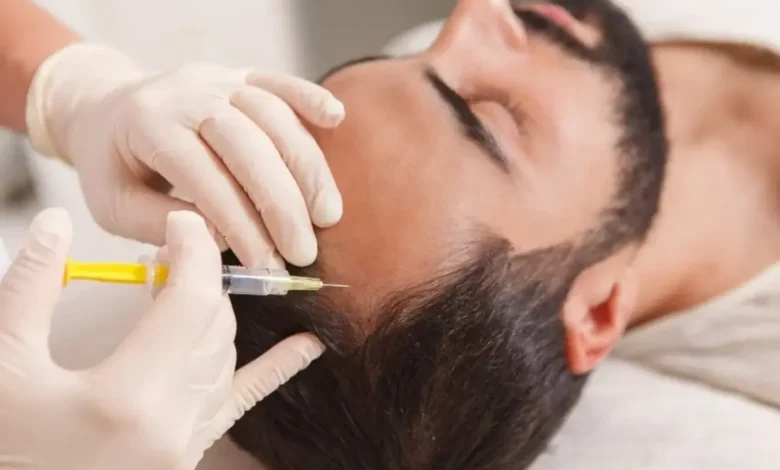Complex Relationship Between Hormone Therapy and Hair Health

Hormone replacement therapy (HRT) is widely acknowledged for its potential to alleviate symptoms that are associated with hormonal imbalances or transitions. It helps offer relief and transformative benefits to many. Yet, an unexpected challenge some individuals face while undergoing this treatment is hair loss on HRT. This issue, though not universally experienced, can be distressing. It casts a shadow over the otherwise positive aspects of therapy. Looking into the mechanisms behind this phenomenon reveals a complex interplay of factors. This can influence hair health during HRT.
Science Behind Hormones and Hair Growth
Hair loss, medically termed alopecia, can manifest in different forms, ranging from gradual thinning to more pronounced shedding or bald patches. While it’s natural for individuals to shed daily, noticeable loss can be distressing, affecting self-esteem and overall well-being.
Hair growth is intricately linked to hormonal fluctuations. Androgens, such as testosterone, significantly impact follicles, influencing their growth cycle. On the flip side, estrogens are believed to promote growth by extending the anagen phase. This is the period when hair is actively growing. Thus, when hormone levels fluctuate, particularly during HRT, these changes can disrupt the normal cycle of growth and shedding. This can potentially lead to hair loss.
Identifying the Culprits: Androgens and Estrogens
The relationship between androgens and hair loss is well-documented, with conditions such as androgenetic alopecia being attributed to the sensitivity of follicles to these hormones. Hormone replacement therapy often involves adjusting the levels of androgens and estrogens in the body, aiming to establish a hormonal balance that aligns with an individual’s gender identity or alleviates symptoms of menopause. However, this adjustment period can temporarily disrupt growth patterns, leading to shedding or thinning in some individuals.
Furthermore, the impact of estrogen on hair is somewhat double-edged. They can promote growth. However, an abrupt fluctuation in their levels can also precipitate loss. This is something common during the initiation of Hormone replacement therapy. The paradox represents the delicate balance required in therapy and the need for proper treatment plans.
Genetic Predisposition and Sensitivity
Genetic predisposition and sensitivity to hormonal changes further complicate the relationship between hormone therapy and health. Individuals with a family history of conditions like androgenetic alopecia may find themselves more vulnerable to experiencing thinning or loss while undergoing HRT. This genetic susceptibility, combined with the body’s unique response to hormonal shifts, can significantly impact the severity and duration of related side effects.
For those grappling with loss, seeking professional guidance from healthcare providers is crucial. A proper evaluation can help identify underlying causes of loss and tailor treatment strategies accordingly.
Strategies for Managing Hair Loss During HRT
Managing hair loss on HRT involves a multifaceted approach tailored to the individual’s specific circumstances and needs. Dermatologists and endocrinologists can work together to monitor hormone levels and adjust treatment plans accordingly. In some cases, topical treatments such as minoxidil, which is known to stimulate growth, may be recommended. Additionally, incorporating a nutrient-rich diet and supplements, like biotin and zinc, can support health from the inside out.
Stress management is another crucial aspect of addressing loss. Stress can exacerbate hormonal imbalances and negatively impact growth. Therefore, practices such as mindfulness, yoga, and regular exercise can be beneficial in mitigating stress levels and promoting overall well-being.
Looking Forward: Research and Personalized Care
The field of hormone therapy continues to evolve, with ongoing research aiming to better understand and mitigate side effects such as hair loss. Advances in personalized medicine and genomics hold promise for developing more targeted and effective approaches to the therapy, potentially reducing the incidence of undesirable side effects.
In the meantime, open communication between patients and healthcare providers is essential. By discussing concerns and experiences openly, individuals can receive the support and guidance needed to navigate the complexities of therapy, ensuring that the journey towards hormonal balance is as smooth and positive as possible.
Conclusion
While hair loss on HRT can be a concerning consequence for some individuals, it’s important to weigh this against the overall benefits of hormone therapy. With the right strategies and support, individuals can manage this challenge effectively, making strides toward their health and well-being goals.
Ultimately, navigating the complex relationship between hormone therapy and hair health requires patience, diligence, and a collaborative approach between individuals and their healthcare providers. While the loss may pose challenges along the journey of hormone transition or menopausal management, it’s essential to remember that it does not define one’s identity or worth. Embracing self-care and seeking support from understanding communities can help individuals embrace their unique beauty and resilience.







